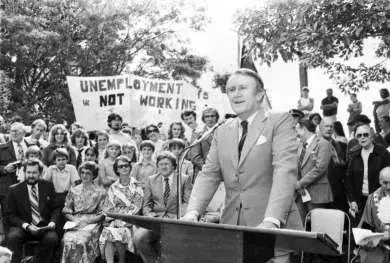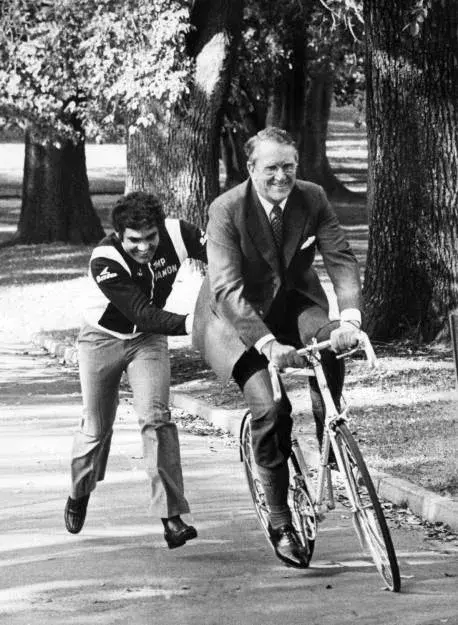MALCOLM FRASER
Member of the Privy Council (1976), Order of the Companion of Honour (1977), Companion of the Order of Australia (1988), Human Rights Medal (2000)
Malcolm Fraser became Australia's 22nd prime minister when the Liberal Party won office, following the dismissal by the Governor-General of the Labor government led by Gough Whitlam
21 May 1930
Melbourne, Victoria
10 March 2015
Melbourne, Victoria
Tamie Fraser
Liberal
Photo: Jackie Haynes/Sydney Morning Herald
About
Malcolm Fraser was an economic traditionalist and a social reformer, particularly in the areas of immigration and multiculturalism. He believed in order, and proper process, and mastered collective responsibility and the machinery of government.

Photo: J.Barton/Fairfax
Yet he was also willing to engage in brinkmanship to achieve political goals, and this won him both admirers and enemies.
Malcolm Fraser's challenge was to become known in his electorate of Wannon before Liberal preselection in November 1953, given his years away at Oxford and his youthful shyness.
His preselection win was unexpected and, though he lost the 1954 election by 17 votes, he won convincingly in 1955 to become the youngest member of the Menzies government.
When Harold Holt became prime minister in 1966, Fraser was appointed Army Minister, and then followed roles as Minister for Education and Science, Minister for Defence and Leader of the Opposition. Fraser became caretaker prime minister in November 1975, following the dismissal of the Whitlam government, and won a decisive election victory in December. He lost government and left the parliament in 1983, and his party in 2009.
MILESTONES
Aboriginal Land Rights Act, Northern Territory
The first legislation passed by an Australian Government to legally recognise the Aboriginal system of land ownership.
Department of Immigration and Ethnic Affairs
Immigration policies and programs are brought together again in a new department, with the addition of ethnic affairs reflecting its role in migrant settlement.
Defence White Paper
Australian Defence focused on the defence forces being able to operate in Australia's maritime region with a clear emphasis on self reliance.
First sitting of the Federal Court of Australia
The new Federal Court’s jurisdiction is broad, covering almost all civil matters arising under Australian Federal law and some summary and indictable criminal matters.
Commonwealth Heads of Government Regional Meeting
The first CHOGRM meeting of Pacific Island Commonwealth states is held in Sydney, convened by Fraser in collaboration with Indian Prime Minister Morarji Desai.
Australian Federal Police formed
The AFP is formed from the Commonwealth Police, the Australian Capital Territory Police and the Federal Narcotics Bureau. The catalyst for its formation was the Sydney Hilton Hotel bombing.
Australian Institute of Multicultural Affairs Act
AIMA is established to raise awareness of cultural diversity and promote social cohesion, understanding and tolerance.
Special Broadcasting Service
Full time multicultural broadcasting begins in Sydney and Melbourne on 4 October 1980, with a documentary on multiculturalism entitled Who Are We?
Commonwealth Heads of Government
Participating governments agree to the Melbourne Declaration which 'clarifies and extends the Commonwealth commitment to a fair international economic and financial system, and support for struggling poor countries.'
Human Rights Commission Act
Australia's first federal Human Rights Commission is established.
Freedom of Information Act
The Freedom of Information Act provides a legal right of access to government documents and enhances the transparency of government activities.
360° VIEW
Parliament
Following the dramatic 1975 election, the Fraser Government enjoyed a majority in both houses. The Liberal-National Country Party Coalition continued with, and adapted, legislation initiated by the Whitlam Government including the passage of the Aboriginal Land Rights Act for the Northern Territory in 1976, followed by the Aboriginal Development Commission Act in 1980.
The Fraser Government's legislative program also increased immigration numbers, with about 200,000 arriving from Asia between 1975 and 1982. Included in this were approximately 56,000 Vietnamese and other refugees from Indochina who had been displaced by the Vietnam War. The 1976 Defence White Paper, in the wake of significant changes in the region, was considered a breakthrough in independent thinking.
In difficult economic times, Fraser's policies hinged on restraint: he devalued the Australian dollar and retained Medibank by allowing it to compete with private hospital funds on hospital accommodation. Against a backdrop of drought and international recession, the 1982-83 budget included stimulatory measures and a modest deficit, reflecting Fraser's approach to the worsening economic environment.

Photo: Michael Potter/Newspix

